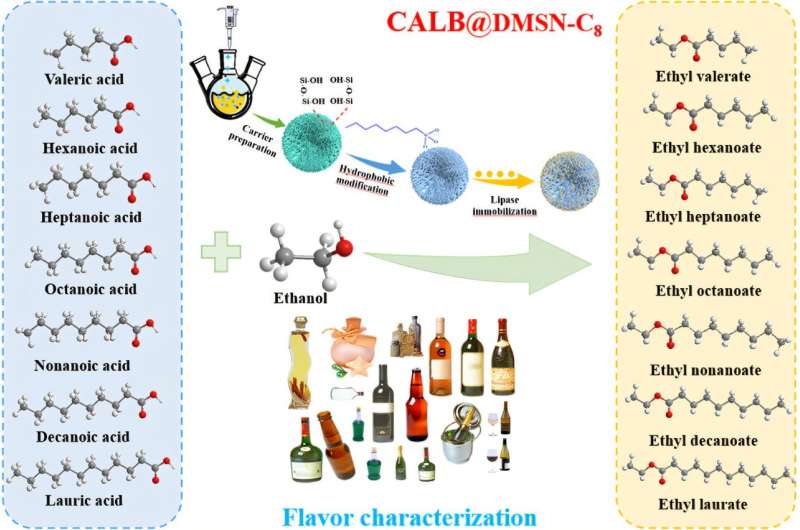Science
Researchers Unveil Breakthrough Enzyme Technology to Enhance Flavor Production

Researchers at Newcastle University have announced a groundbreaking development in enzyme technology, introducing a highly efficient and reusable biocatalyst that has significant implications for the food and cosmetics industries. This innovative method, co-led by an international team, focuses on a unique approach to enzyme attachment using specially designed, sponge-like silica particles. The result is a solvent-free production process for flavor esters, essential components that contribute to the appealing scents and tastes found in various products.
Innovative Approach to Flavor Ester Production
The findings were published on July 24, 2025, in the Journal of Agricultural and Food Chemistry, where they received notable recognition by being featured on the journal’s cover. The study addresses critical challenges in biocatalysis, achieving remarkable catalytic efficiency, thermal stability, and reusability. This advancement positions the new enzyme technology as a promising solution for industrial applications, ranging from flavor and fragrance synthesis to broader bioprocessing uses.
Dr. Vladimir Zivkovic, a Senior Lecturer at the School of Engineering, expressed excitement about the research, stating, “This research marks a significant leap forward in the field of enzyme technology and green chemistry. The ability to achieve such high conversion rates with excellent reusability opens new pathways for industrial applications.” He emphasized the achievement of having this work highlighted on the journal cover, celebrating the success of a Newcastle alumnus leading such impactful innovation.
Interdisciplinary Collaboration Drives Success
Another co-author, Dr. Kheng-Lim Goh, an Associate Professor and Reader in Mechanics of Composite Materials at Newcastle University in Singapore, highlighted the collaborative nature of the project, stating, “The work showcases how an interdisciplinary approach—combining materials science, biochemical engineering, and computational modeling—can overcome long-standing challenges in enzyme design.” He noted that the feature on the journal’s cover underscores the significance of their findings and reflects the global reach of Newcastle’s research culture.
Lead author Dr. Yi Zhang, who completed both her MSc and Ph.D. at Newcastle, represents a new generation of scientists committed to driving innovation with real-world applications. Her work, alongside her colleagues, emphasizes the importance of this advancement in enzyme technology for enhancing flavor production.
This milestone not only signifies a scientific breakthrough but also highlights the ongoing impact of research conducted at Newcastle University. As the field of enzyme technology continues to evolve, such developments promise to play a vital role in shaping sustainable practices within the food and cosmetics industries.
For further details, refer to the study: Run Liu et al, “Novel Immobilized Enzyme System Using Hydrophobic Dendritic Mesoporous Silica Nanospheres for Efficient Flavor Ester Production,” published in the Journal of Agricultural and Food Chemistry (2025). DOI: 10.1021/acs.jafc.4c12029.
-

 Health3 months ago
Health3 months agoNeurologist Warns Excessive Use of Supplements Can Harm Brain
-

 Health3 months ago
Health3 months agoFiona Phillips’ Husband Shares Heartfelt Update on Her Alzheimer’s Journey
-

 Science2 months ago
Science2 months agoBrian Cox Addresses Claims of Alien Probe in 3I/ATLAS Discovery
-

 Science2 months ago
Science2 months agoNASA Investigates Unusual Comet 3I/ATLAS; New Findings Emerge
-

 Science1 month ago
Science1 month agoScientists Examine 3I/ATLAS: Alien Artifact or Cosmic Oddity?
-

 Entertainment5 months ago
Entertainment5 months agoKerry Katona Discusses Future Baby Plans and Brian McFadden’s Wedding
-

 Science1 month ago
Science1 month agoNASA Investigates Speedy Object 3I/ATLAS, Sparking Speculation
-

 Entertainment4 months ago
Entertainment4 months agoEmmerdale Faces Tension as Dylan and April’s Lives Hang in the Balance
-

 World3 months ago
World3 months agoCole Palmer’s Cryptic Message to Kobbie Mainoo Following Loan Talks
-

 Science1 month ago
Science1 month agoNASA Scientists Explore Origins of 3I/ATLAS, a Fast-Moving Visitor
-

 Entertainment2 months ago
Entertainment2 months agoLewis Cope Addresses Accusations of Dance Training Advantage
-

 Entertainment3 months ago
Entertainment3 months agoMajor Cast Changes at Coronation Street: Exits and Returns in 2025









